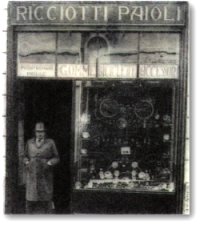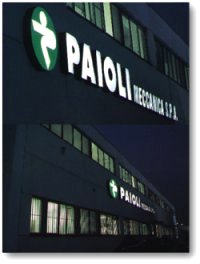
 
|
PAIOLI PRESENTATION
Paioli Meccanica was established on 10 November 1973 through the buy-up of the Bonazzi e Gambetta company, which had been operating for about 20 years and, up to then, had produced forks for all Moto Morini models.
In those days, Paioli was already producing mudguards, shock absorbers and petrol taps for motorcycles, but the burgeoning market made it clear that there was plenty of room for growth in the field of front suspensions, which had to adapt to the new generation of motorcycles presented by all companies.
So, in the early 70s, Maria Giovanna Gnudi and Luciano Santovito, the
company's current Chairwoman and Managing Director, decided to specifically
handle this product area, and as a result, Paioli Meccanica was created
from a division of the original company (established in 1911).
The declared aim of the two proprietors was to start producing "Ceriani
type" forks as soon as possible. These forks were then considered
the best in the world.
The first recognition came from Ducati and Cagiva, later followed by
Peugeot and Motobecane, who decided to use Paioli Meccanica products as
their standard equipment.
At that time, the chief problem for motorcycle manufacturers was to obtain
reliable delivery lead-times for the selected components.
Competing companies produced many products that were very similar to each
other and, in this situation, attention to high-tech and styling aspects
was not considered central.
The turn-around
The first significant change in company policy happened in the early 80s,
when the entire European industry had to face increasing Japanese competition,
with its very high quality standard.
Consequently, producers began to focus increasingly on technological research,
although the main aim was still creating products that were, above all,
economically competitive, and of sufficient overall quality to face competition.
1986 marked another important step ahead: quality on its own was not enough,
technology became increasingly sophisticated and the public began to consider
overall design as increasingly important. Paioli Meccanica reacted to
stimuli from the outside world and set up the Paioli Research and Development
centre in Tradate, near Varese.
From the early 90s, the company began to devote more and more effort to
creating original products, with the technological, construction and design
characteristics sufficient to convince motorbike manufacturers to use
them. That meant changing more and more incisively the existing trend
whereby parts available on the market were "simply" installed
en masse. With this new commercial logic, Paioli Meccanica succeeded in
presenting new types of fork, decidedly more advanced compared to the
past: there was an on-going increase in parts, which were assembled to
each other and not built as a single piece, whereas, as far as the engine
was concerned, the innovative "cartridge" system soon replaced
the classic piston pump solutions.
The synergies
This was an important technology improvement calling for in-depth design
and construction know-how in the more sophisticated models, and, at the
time, the company did not yet have this know-how.
So Paioli Meccanica decided to drastically cut-down "industrial learning"
time, by seeking partners who could provide design skills, construction
experience and knowledge of the materials, all of which would have needed
too much time and money to acquire directly.
So, after long, complex negotiations, at the end of March 1994, a technical
and commercial co-operation agreement was reached with Kayaba, on of the
world's leading suspension producers.
Today, Paioli Meccanica is ready to face the global motorcycle market,
with products suitable for all segments, thanks to its wealth of experience
and commercial success acquired in its first twenty years of activity.
Today
Today, Paioli Meccanica has a highly defined, technologically advanced
identity, able to guarantee:
- On-going research;
- Uniform production;
- Original styling solutions.
This is an extremely important set of elements, giving life, among other
things, to a product anyone can easily recognise at first sight.
And that's not all: Paioli Meccanica is a reliable, invaluable partner,
from the early design stages through to final industrialisation of the
vehicle: in fact, out Technical Department is on hand at any time to assist
the managers of a complete project, providing all possible help in creating
parts that are both central to the functioning of the vehicle and crucial
in defining final styling.
People buying a motorcycle are motivated not only by reasons they consider
rational but also by a strong element of passion.
As a result, it is essential for a componentry producer to know how to
cooperate with the motorcycle producer by supplying a comprehensive consulting
service, and this must happen even ahead of a technical valid product
with an up-to-date look.
So we are looking to provide consultation aimed at creating a final product
that meets the client's requirements, anticipates his/her wishes, and
also satisfies his/her less evident passionate aspects.
 Paioli
Meccanica is seeking to actively play a leading role in the world of production
and believes it is ready to do this in the right way.
Paioli
Meccanica is seeking to actively play a leading role in the world of production
and believes it is ready to do this in the right way.
| Year | Forks Sales |
| 1990 | 79.301 |
| 1991 | 65.654 |
| 1992 | 75.861 |
| 1993 | 95.272 |
| 1994 | 189.454 |
| 1995 | 249.980 |
| 1996 | 293.454 |
| 1997 | 278.744 |
| 1998 | 281.749 |
| 1999 | 310.734 |